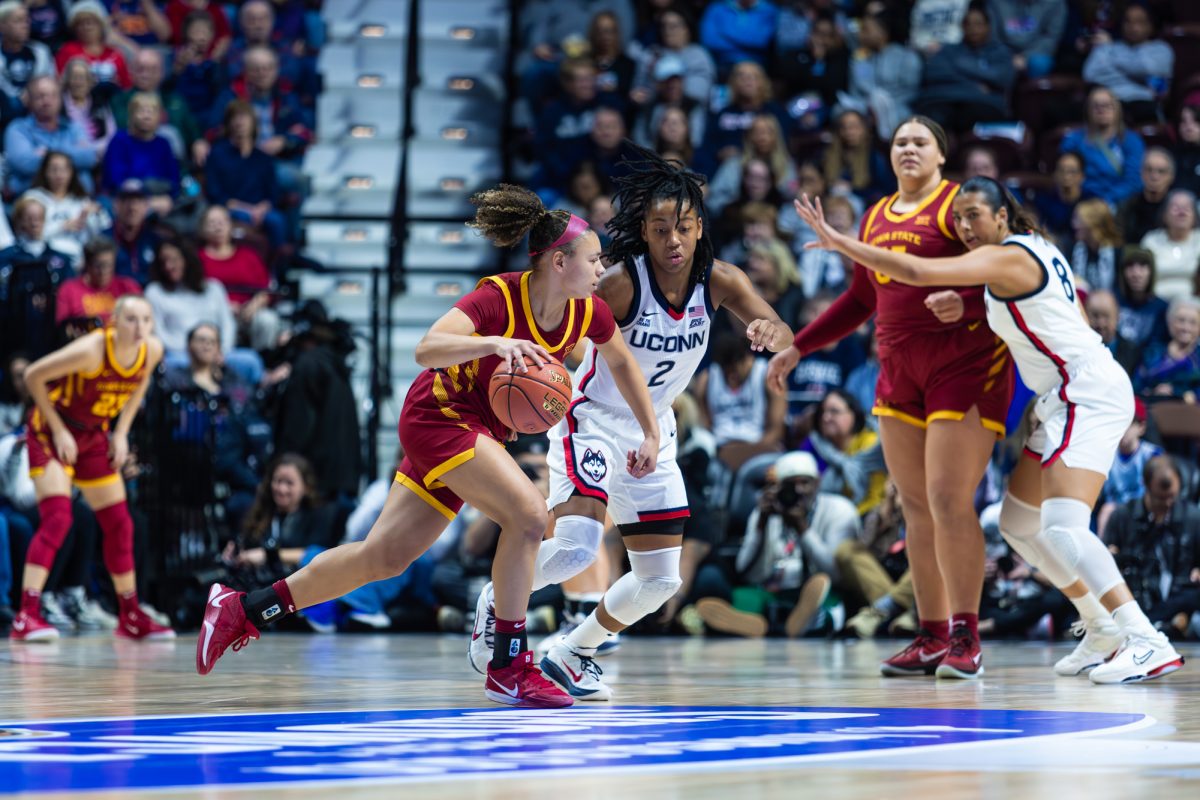Sea of candles lights the way for gay rights
October 11, 2007
Correction: The comments attributed to Rev. Mary Jane Button-Harrison were actually said by Carolyn Jenison, executive director of One Iowa. Button-Harrison did not attend the event, but a statement from her was read to the crowd. The Daily regrets the error.
A sea of candles clustered around the Campanile at 7 p.m. Thursday night as people gathered for the Ames Straight Night for Equal Rights to advocate straight people standing up for the gay community.
Michelle Garland, graduate student in curriculum and instruction, said the candles were representative of the 1,138 rights that are denied to gay couples by not allowing them to marry.
The event was a small part of the nationwide Seven Straight Nights for Equal Rights, which occurs Oct. 7 through 13.
Garland named a few of the rights gays are denied, such as access to a spouse’s health and life insurance, automatic next-of-kin status, bereavement leave after the death of a spouse, leave to file wrongful death claims and access to Social Security after a spouse’s death.
Terry Lowman and Mark Kassis, who applied for a marriage license in August and co-own Lucullan’s, 400 Main St., were also in attendance.
“We’re part of society. Despite Mahmoud Ahmadinejad’s comment that there are no gays in Iran, I think that you can be pretty sure that there are,” Lowman said. “We’re urban, we’re rural; we’re rich, poor; we’re clergy, laity; we’re mechanics, we’re just about everything. We’re black and white; a lot of us are married to a spouse of a different sex.”
He used the recent incident involving Sen. Larry Craig, R-Idaho, as an example of people being in heterosexual marriage while being attracted to those of the same sex.
“I see video of his wife with him; I see a lot of pain and I think that’s really sad,” Lowman said. “I think everybody knows somebody gay. Whether you believe that God made us gay or it’s evolution, there’s probably a reason why we’re gay.”
He said marriage wasn’t just about having children and because people in gay unions have the same responsibilities to each other that those in straight unions do, they should have the same rights as well.
“I personally don’t have a problem if you want to call it marriage or civil union, but if it’s marriage for the heterosexuals, then it needs to be marriage for the gay people,” Lowman said.
He said a couple of months before, he and Kassis had stood up before their friends, family and church and declared their love for one another. He said it felt really good.
“You know, I don’t think little boys as much sit around and think about what their marriage is going to be like and their wedding and all that,” Lowman said. “I mean, maybe some little boys do, but this little boy didn’t.”
He said he thinks anyone who wants to get married should be able to do so.
“Our society has a responsibility to us, to treat us equally,” Lowman said.
Sean Fritz, senior in computer science, who was married in August to Timothy McQuillan, junior in genetics, also said a few words to the crowd.
After introducing him and asking if she could embarrass him, Garland said he was one of her best friends.
“I just wanted to say that marriage is actually one of the most profound things that’s ever happened to me,” Fritz said.
He said even though he was only 24 and hasn’t been married for long, he hadn’t realized until he got married exactly how important it was.
“On a personal and emotional level, it’s quite possibly the most fundamentally important thing that you can do as an adult in this country,” Fritz said.
He then said that for people to try and tell him that he couldn’t get married just because they disagreed with him, he felt as though they were trying to treat him and other gay people as second-class citizens.
“I really think that we should definitely be forward on this issue,” Fritz said.
He said he wanted to speak about the fact that even if Iowa does legalize same-sex marriage, there will still be plenty of rights that they are denied on the federal level because of discriminating policies.
“We need to be aware of the fact that the federal government needs to change their policies,” Fritz said.
Rev. Mary Jane Button-Harrison of First Christian Church of Ames, 611 Clark Ave., spoke briefly about her partner. She said she’d recently been denied entry into a room at the doctor’s office and had to argue to gain entry.
Sadly, she said by the time she’d been able to get into the room, her partner had already been informed that she had malignant cancer and Harrison hadn’t been able to be there to comfort her.
The sun had gone down and it had gotten considerably colder, so that when Rev. Brian Eslinger, of the Unitarian Universalist Fellowship of Ames, 1015 North Hyland Ave., spoke and everyone was given a candle, there were a lot of people warming their fingers.
Thomas Wilke, sophomore in history, said he was a member of the ISU chapter of the American Civil Liberties Union and that he tries to attend the Lesbian, Gay, Bisexual, Transgender Ally Alliance events because he supports gay marriage.
Kendall Foss, senior in chemical engineering and president of the ISU chapter of the ACLU, was also present and spoke a few words to the crowd, explaining that the ACLU advocates equal rights for everyone.






